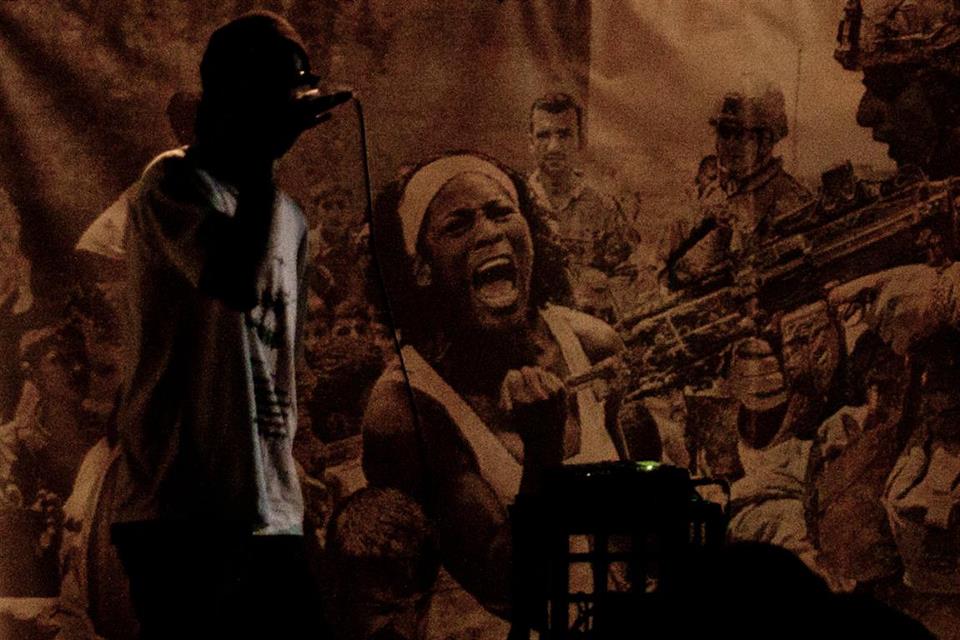Accepting Australian political rock band Midnight Oil’s induction into the ARIA hall of fame, the band’s drummer, Rob Hirst, commented: “Bush finally admitted that Iraq may prove to be his Vietnam. But Vietnam inspired some of the greatest protest songs ever written. Not so now, surprisingly, even when hundreds of thousands of Australians crowded our streets to demonstrate their opposition to another senseless war.”
Hirst’s speech sparked intense debate across the “music industry” as to whether or not it was political. Triple J radio presenter Richard Kingsmill told The Age, “If you were a general music lover, you might think there are no political songs being written ... But trust me, political songs are being written, recorded and released all the time in this country. We have boxes of anti-Bush, anti-Howard, anti-Iraq war, anti-racism, pro-choice, pro-environment CDs, all from contemporary local acts.”
Shane Howard, former singer-songwriter for Goanna, points out, “Given that we are entering an era of even greater concentration of media ownership, it will become even harder to hear dissenting voices”.
Howard’s point about media ownership applies not only to music but to all art forms. In May this year political artist and Revolutionary Socialist Party member Van Rudd had an artwork censored from being part of a human rights exhibition, despite having prior permission from the gallery for his art to be included. His Pop Goes the System attacked the human rights record of the Israeli chocolate shop Max Brenner, whose parent company the Strauss Group gives care packages to sections of the Israeli army guilty of a variety of genocidal acts.
Rudd’s exclusion from the Human Rights Arts and Film Festival is not the first and is unlikely to be the last time he has been excluded from the mainstream arts scene for presenting his views. Even when political art is included in exhibitions and festivals, it tends to be hidden or included among a generally apolitical or pro-status quo agenda.
Left space
The recent attacks on Occupy events internationally show us that public spaces aren’t public as far as governments are concerned if the public want to use those spaces for something other than consumerist purposes. While it is important to continue the fight for the right to communicate political ideas on the street, the left needs space to come together to explore ideas and discuss and debate the way forward. We also need to find avenues to attract new people to resisting the injustices of capitalism.
Long-running institutions like the New International Bookshop in Melbourne provide a central intellectual hub, but there hasn’t really been a left cultural artistic space in Melbourne for some time. For this reason we are launching Under the Hammer (UtH) an arts-activist collective that is setting up an arts space solely for the purpose of generating and presenting political art. While many artistic spaces are set up to accommodate a particular medium, UtH exists to unite artists from a variety of backgrounds: visual, spoken word, film etc.
The name Under the Hammer comes out of a discussion about the role of art in society. The artists founding UtH strongly agree with the sentiments expressed by Vladimir Mayakovsky, often attributed to Bertolt Brecht, “Art is not a mirror to reflect the world, but a hammer with which to shape it”.
We seek to create a space where political artists can present their work. The space will also be a place to discuss, debate and critique political art and from there political ideas as a whole. Art is both a useful way to draw new people into political movements and a useful forum for debating political ideas. UtH, while initiated by members of the Revolutionary Socialist Party, is not a party “front”, and the project incorporates a number of artists from a variety of political perspectives: Marxist, anarchist, small “l” liberal etc.
Occupy Melbourne
Many of the people involved in UtH were part of Occupy Melbourne and were upset by some spokespeople’s attempts to “unify” the movement by telling people to “leave their politics at the door”. Far from hiding people’s affiliations, art is a great medium to discuss them.
By creating a space that is overtly political, UtH will serve as a magnet for those attracted to progressive ideas. Within this cultural arena, people can share their thoughts and be won over to various positions based on their agreement with them rather than being told, “It isn’t cool to be political”.
Already UtH has confirmed that exhibitions around the Tamil struggle and the campaign against Agent Orange will be taking place in 2012. Many other events, including regular political comedy, film-making workshops and play reading evenings, are in the pipeline. As UtH’s reputation grows, we hope to attract people to a greater diversity of political and artistic activity. By creating a central location that focuses on artworks that have something to say about the world we hope to bring them from the margins to the fore and challenge the “artistic” status quo.
[James Crafti is a founder of UtH and a member of the Revolutionary Socialist Party. UtH opens at 158 Sydney Road, Coburg, Melbourne, in February]

